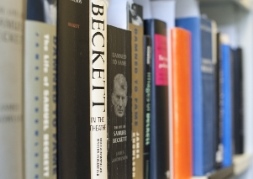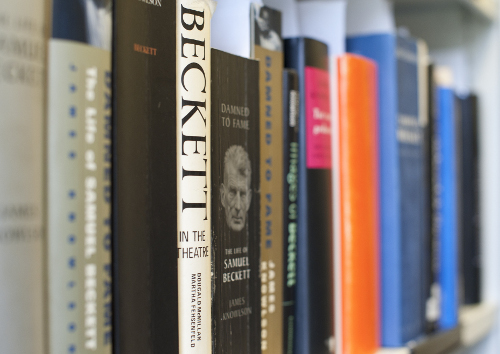 The University of Reading and the Beckett International Foundation are delighted to announce the purchase of a unique archive of actress Billie Whitelaw’s work with playwright Samuel Beckett.
The University of Reading and the Beckett International Foundation are delighted to announce the purchase of a unique archive of actress Billie Whitelaw’s work with playwright Samuel Beckett.
The £35,000 acquisition, funded by generous contributions from the Beckett International Foundation, the Arts Council England/Victoria and Albert Museum Purchase Grant Fund and the Friends of the National Libraries, was made at an auction at Sotheby’s, London, last week.
Billie Whitelaw was Irish writer and Nobel Prize winner Samuel Beckett’s favourite actress. He directed her in several theatrical productions and revivals of his plays. The collection includes correspondence, annotated playscripts, rehearsal notes for some of Beckett’s most famous works, including Play, Not I, Happy Days, Rockaby, Eh Joe, Embers and Footfalls, as well costumes worn by Billie during those performances.
The items will join the rest of our Beckett Collection, which is the world’s largest collection of manuscript materials relating to Beckett. This will offer anyone with an interest in Beckett’s plays or the theatre a unique insight into how one of the world’s greatest writers worked with his actors.
Billie Whitelaw has had close links with the University of Reading since 1992 when she became the first Annenberg Fellow. During her week-long residency, she gave a series of workshops and performances for staff, students and members of the public. Over the years she has been an important supporter of the Beckett Collection and is still a Patron of the Beckett International Foundation. In 2001 she received an Honorary Degree of Doctor of Letters from the University of Reading.
Billie famously performed ‘Not I’ in 14 minutes at the Royal Court in 1973. The University hosted two rare performances of this iconic Samuel Beckett work which were performed by Lisa Dwan in 2013.
The Billie Whitelaw archive will feature in public events (such as exhibitions) and in undergraduate and postgraduate teaching programmes.




 Emeritus Professor Jim Knowlson was awarded an OBE in the New Year’s Honours List for services to literary scholarship. Jim is the world’s leading expert on the Nobel-prize winning novelist and playwright Samuel Beckett and the founder of Reading’s Beckett International Foundation. He is instrumental in the work of the Beckett Archive and Beckett’s only authorised biographer.
Emeritus Professor Jim Knowlson was awarded an OBE in the New Year’s Honours List for services to literary scholarship. Jim is the world’s leading expert on the Nobel-prize winning novelist and playwright Samuel Beckett and the founder of Reading’s Beckett International Foundation. He is instrumental in the work of the Beckett Archive and Beckett’s only authorised biographer.